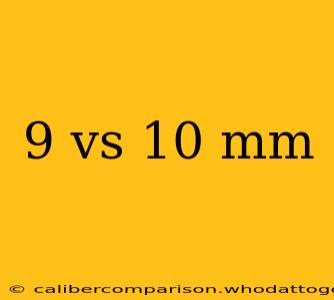9mm vs 10mm: A Deep Dive into Caliber Differences
Choosing the right caliber for your firearm is a crucial decision, impacting everything from accuracy and stopping power to recoil and ammunition availability. This detailed comparison of 9mm and 10mm cartridges will help you understand the key differences and determine which might be the better fit for your needs.
Understanding Caliber: More Than Just Numbers
Before diving into the specifics, it's important to understand that the numbers "9mm" and "10mm" refer to the diameter of the bullet, measured in millimeters. While seemingly a small difference, this seemingly insignificant 1mm variation leads to substantial differences in performance.
Ballistics: A Tale of Two Cartridges
The core differences between 9mm and 10mm lie in their ballistics—the science of projectile motion. Here's a breakdown:
-
9mm: This popular cartridge is known for its relatively mild recoil, high capacity magazines, and widespread availability. It offers good accuracy and sufficient stopping power for many applications, particularly for self-defense and law enforcement. Its smaller size also contributes to lighter, more easily concealable firearms.
-
10mm: The 10mm Auto cartridge packs a significantly more powerful punch. This translates to greater stopping power, making it a favorite among those who prioritize maximum impact. However, this increased power comes at the cost of increased recoil, which can be challenging for less experienced shooters. Ammunition availability can also be somewhat more limited compared to 9mm.
Recoil and Shootability: The Comfort Factor
The difference in recoil between these two calibers is substantial. The 9mm's lighter recoil makes it easier to handle, allowing for faster follow-up shots and improved accuracy, especially during rapid firing. The 10mm's heavier recoil requires more strength and control, potentially leading to fatigue and reduced accuracy during prolonged shooting sessions. This difference is crucial for both experienced and novice shooters.
Stopping Power: The Crucial Difference
Stopping power, the ability of a round to incapacitate a target, is a complex issue often debated among firearms enthusiasts. While 9mm provides reliable stopping power in many scenarios, the 10mm’s larger caliber and higher energy transfer generally result in greater potential for immediate incapacitation. However, shot placement remains the most crucial factor in achieving a desired effect regardless of caliber.
Applications and Use Cases: Finding the Right Fit
The choice between 9mm and 10mm often depends on the intended use:
-
9mm: Ideal for concealed carry, self-defense, law enforcement (particularly for patrol officers), and target shooting. Its lighter recoil and higher capacity magazines make it versatile and manageable in various situations.
-
10mm: Better suited for hunting larger game (within appropriate ethical hunting guidelines), personal protection against larger threats, and situations where maximum stopping power is paramount. Its potent nature is not ideal for everyday carry for many users due to the increased recoil.
Ammunition Availability and Cost: Practical Considerations
9mm ammunition is widely available and relatively inexpensive, making it a cost-effective choice for regular practice and training. 10mm ammunition, while available, is generally less common and slightly more expensive.
Conclusion: Choosing Your Caliber
The "better" caliber between 9mm and 10mm depends entirely on individual needs and priorities. The 9mm offers a balance of manageable recoil, high capacity, and widespread availability, making it a versatile choice for many. The 10mm, with its superior stopping power, is a compelling option for those prioritizing maximum impact, but requires more training and handling expertise due to its significant recoil. Careful consideration of your specific needs, experience level, and intended use case is crucial in making the right decision.

